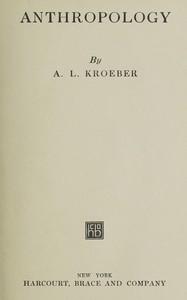Read this ebook for free! No credit card needed, absolutely nothing to pay.
Words: 193143 in 65 pages
This is an ebook sharing website. You can read the uploaded ebooks for free here. No credit cards needed, nothing to pay. If you want to own a digital copy of the ebook, or want to read offline with your favorite ebook-reader, then you can choose to buy and download the ebook.
INDEX 507
FIGURE PAGE
ANTHROPOLOGY
SCOPE AND CHARACTER OF ANTHROPOLOGY
Anthropology is the science of man. This broad and literal definition takes on more meaning when it is expanded to "the science of man and his works." Even then it may seem heterogeneous and too inclusive. The products of the human mind are something different from the body. And these products, as well as the human body, are the subjects of firmly established sciences, which would seem to leave little room for anthropology except as a less organized duplication. Ordinary political history, economics, literary criticism, and the history of art all deal with the works and doings of man; biology and medicine study his body. It is evident that these various branches of learning cannot be relegated to the position of mere subdivisions of anthropology and this be exalted to the rank of a sort of holding corporation for them. There must be some definite and workable relation.
One way in which this relation can be pictured follows to some extent the course of anthropology as it grew into self-consciousness and recognition. Biology, medicine, history, economies were all tilling their fields of knowledge in the nineteenth century, some with long occupancy, when anthropology shyly entered the scene and began to cultivate a corner here and a patch there. It examined some of the most special and non-utilitarian aspects of the human body: the shape of the head, the complexion, the texture of the hair, the differences between one variety of man and another, points of negligible import in medicine and of quite narrow interest as against the broad principles which biology was trying to found and fortify as the science of all life. So too the historical sciences had pre?mpted the most convenient and fruitful subjects within reach. Anthropology modestly turned its attention to nations without records, to histories without notable events, to institutions strange in flavor and inventions hanging in their infancy, to languages that had never been written.
Yet obviously the heterogeneous leavings of several sciences will never weld into an organized and useful body of knowledge. The dilettante, the collector of oddities who loves incoherence, may be content to observe to-day the flare of the negro's nostrils, to-morrow the intricacy of prefixes that bind his words into sentences, the day after, his attempts to destroy a foe by driving nails into a wooden idol. A science becomes such only when it learns to discover relations and a meaning in facts. If anthropology were to remain content with an interest in the Mongolian eye, the dwarfishness of the Negrito, the former home of the Polynesian race, taboos against speaking to one's mother-in-law, rituals to make rain, and other such exotic and superseded superstitions, it would earn no more dignity than an antiquarian's attic. As a co-laborer on the edifice of fuller understanding, anthropology must find more of a task than filling with rubble the temporarily vacant spaces in the masonry that the sciences are rearing.
The other manner in which the subject of anthropology can be conceived is that this is neither so vast as to include everything human, nor is it the unappropriated odds and ends of other sciences, but rather some particular aspect of human phenomena. If such an aspect exists, anthropology vindicates its unity and attains to integrity of aim.
To the question why a Louisiana negro is black and thick lipped, the answer is ready. He was born so. As dogs produce pups, and lions cubs, so negro springs from negro and Caucasian from Caucasian. We call the force at work, heredity. The same negro is lazy by repute, easy going at his labor. Is this too an innate quality? Off-hand, most of us would reply: Yes. He sings at his corn-hoeing more frequently than the white man across the fence. Is this also because of his heredity? "Of course: he is made so," might be a common answer; "Probably: why not?" a more cautious one. But now our negro is singing Suwanee River, which his great-grandfather in Africa assuredly did not sing. As regards the specific song, heredity is obviously no longer the cause. Our negro may have learned it from an uncle, perhaps from his schoolmates; he can have acquired it from human beings not his ancestors, acquired it as part of his customs, like being a member of the Baptist church and wearing overalls, and the thousand other things that come to him from without instead of from within. At these points heredity is displaced by tradition, nature by nurture, to use a familiar jingle. The efficient forces now are quite different from those that made his skin black and his lips thick. They are causes of another order.
The particular song of the negro and his complexion represent the clear-cut extremes of the matter. Between them lie the sloth and the inclination to melody. Obviously these traits may also be the result of human example, of social environment, of contemporary tradition. There are those that so believe, as well as those who see in them only the effects of inborn biological impulse. Perhaps these intermediate dubious traits are the results of a blending of nature and nurture, the strength of each factor varying according to each trait or individual examined. Clearly, at any rate, there is room here for debate and evidence. A genuine problem exists. This problem cannot be solved by the historical sciences alone because they do not concern themselves with heredity. Nor can it be solved by biology which deals with heredity and allied factors but does not go on to operate with the non-biological principle of tradition.
Here, then, is a specific task and place in the sun for anthropology: the interpretation of those phenomena into which both organic and social causes enter. The untangling and determination and reconciling of these two sets of forces are anthropology's own. They constitute, whatever else it may undertake, the focus of its attention and an ultimate goal. No other science has grappled with this set of problems as its primary end. Nor has anthropology as yet much of a solution to offer. It may be said to have cleared the ground of brush, rather than begun the felling of its tree. But, in the terminology of science, it has at least defined its problem.
To deal with this interplay of what is natural and nurtural, organic and social, anthropology must know something of the organic, as such, and of the social, as such. It must be able to recognize them with surety before it endeavors to analyze and resynthesize them. It must therefore effect close contact with the organic and the social sciences respectively, with "biology" and "history," and derive all possible aid from their contributions to knowledge. Up to the present time, a large part of the work of anthropology has consisted in acquiring the fruits of the activity of these sister sciences and applying them for its own ends; or, where the needed biological and historical data were not available, securing them.
Free books android app tbrJar TBR JAR Read Free books online gutenberg
More posts by @FreeBooks











